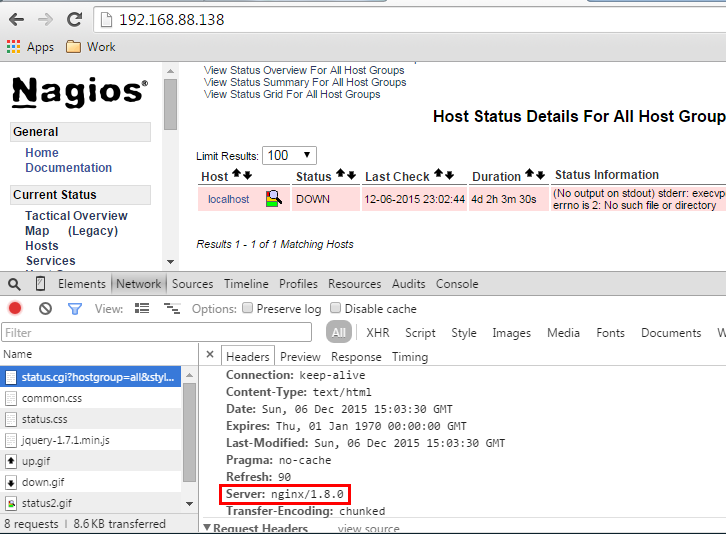Nginx+nagios安装配置
[root@Nagios ~]# vi /etc/nginx/nginx.conf server { listen 80; server_name localhost; auth_basic "Nagios Access"; auth_basic_user_file /usr/local/nagios/passwd; location / { root /usr/local/nagios/share; index index.html index.htm index.php; } location ~ .*.(php|php5)?$ { root /usr/local/nagios/share; fastcgi_pass 127.0.0.1:9000; fastcgi_index index.php; include fastcgi.conf; } location /nagios { alias /usr/local/nagios/share; } location /cgi-bin/images { alias /usr/local/nagios/share/images; } location /cgi-bin/stylesheets { alias /usr/local/nagios/share/stylesheets; } location /cgi-bin { alias /usr/local/nagios/sbin; } location ~ .*.(cgi|pl)?$ { gzip off; root /usr/local/nagios/sbin; rewrite ^/nagios/cgi-bin/(.*).cgi /$1.cgi break; fastcgi_pass unix:/var/run/perl-fastcgi.sock; fastcgi_param SCRIPT_FILENAME /usr/local/nagios/sbin$fastcgi_script_name; fastcgi_index index.cgi; fastcgi_param REMOTE_USER $remote_user; fastcgi_param HTTP_ACCEPT_LANGUAGE en_US; include fastcgi_params; fastcgi_read_timeout 60; } location /nagiosql/ { alias /usr/local/nagios/nagiosql; } } [root@Nagios ~]# echo -en 'nagios:'>/usr/local/nagios/share/passwd [root@Nagios ~]# perl -e 'print crypt($ARGV[0], "nagios")' passwd >>/usr/local/nagios/share/passwd
# 安装 PHP php-fpm [root@Nagios ~]# yum install -y php php-fpm [root@Nagios ~]# /etc/init.d/php-fpm start
# 安装perl FCGI [root@Nagios ~]# yum install -y perl-devel [root@Nagios src]# wget http://www.cpan.org/modules/by-module/FCGI/FCGI-0.74.tar.gz [root@Nagios src]# tar zxf FCGI-0.74.tar.gz [root@Nagios src]# cd FCGI-0.74 [root@Nagios FCGI-0.74]# perl Makefile.PL [root@Nagios FCGI-0.74]# make && make install [root@Nagios ~]# touch /usr/bin/fastcgi-wrapper.pl [root@Nagios ~]# chmod 755 /usr/bin/fastcgi-wrapper.pl [root@Nagios ~]# vi /usr/bin/fastcgi-wrapper.pl #!/usr/bin/perl use FCGI; use Socket; use POSIX qw(setsid); require 'syscall.ph'; &daemonize; #this keeps the program alive or something after exec'ing perl scripts END() { } BEGIN() { } *CORE::GLOBAL::exit = sub { die "fakeexit rc=".shift()." "; }; eval q{exit}; if ($@) { exit unless $@ =~ /^fakeexit/; }; &main; sub daemonize() { chdir '/' or die "Can't chdir to /: $!"; defined(my $pid = fork) or die "Can't fork: $!"; exit if $pid; setsid or die "Can't start a new session: $!"; umask 0; } sub main { #$socket = FCGI::OpenSocket( "127.0.0.1:8999", 10 ); #use IP sockets $socket = FCGI::OpenSocket( "/var/run/perl-fastcgi.sock", 10 ); $request = FCGI::Request( *STDIN, *STDOUT, *STDERR, \%req_params, $socket ); if ($request) { request_loop()}; FCGI::CloseSocket( $socket ); } sub request_loop { while( $request->Accept() >= 0 ) { #processing any STDIN input from WebServer (for CGI-POST actions) $stdin_passthrough =''; $req_len = 0 + $req_params{'CONTENT_LENGTH'}; if (($req_params{'REQUEST_METHOD'} eq 'POST') && ($req_len != 0) ){ my $bytes_read = 0; while ($bytes_read < $req_len) { my $data = ''; my $bytes = read(STDIN, $data, ($req_len - $bytes_read)); last if ($bytes == 0 || !defined($bytes)); $stdin_passthrough .= $data; $bytes_read += $bytes; } } #running the cgi app if ( (-x $req_params{SCRIPT_FILENAME}) && #can I execute this? (-s $req_params{SCRIPT_FILENAME}) && #Is this file empty? (-r $req_params{SCRIPT_FILENAME}) #can I read this file? ){ pipe(CHILD_RD, PARENT_WR); my $pid = open(KID_TO_READ, "-|"); unless(defined($pid)) { print("Content-type: text/plain "); print "Error: CGI app returned no output - "; print "Executing $req_params{SCRIPT_FILENAME} failed ! "; next; } if ($pid > 0) { close(CHILD_RD); print PARENT_WR $stdin_passthrough; close(PARENT_WR); while(my $s = <KID_TO_READ>) { print $s; } close KID_TO_READ; waitpid($pid, 0); } else { foreach $key ( keys %req_params){ $ENV{$key} = $req_params{$key}; } # cd to the script's local directory if ($req_params{SCRIPT_FILENAME} =~ /^(.*)/[^/]+$/) { chdir $1; } close(PARENT_WR); close(STDIN); #fcntl(CHILD_RD, F_DUPFD, 0); syscall(&SYS_dup2, fileno(CHILD_RD), 0); #open(STDIN, "<&CHILD_RD"); exec($req_params{SCRIPT_FILENAME}); die("exec failed"); } } else { print("Content-type: text/plain "); print "Error: No such CGI app - $req_params{SCRIPT_FILENAME} may not "; print "exist or is not executable by this process. "; } } } [root@Nagios ~]# touch /etc/init.d/perl-fastcgi [root@Nagios ~]# chmod 755 /etc/init.d/perl-fastcgi [root@Nagios ~]# vi /etc/init.d/perl-fastcgi #!/bin/sh # # nginx – this script starts and stops the nginx daemon # # chkconfig: - 85 15 # description: Nginx is an HTTP(S) server, HTTP(S) reverse # proxy and IMAP/POP3 proxy server # processname: nginx # config: /opt/nginx/conf/nginx.conf # pidfile: /opt/nginx/logs/nginx.pid # Source function library. . /etc/rc.d/init.d/functions # Source networking configuration. . /etc/sysconfig/network # Check that networking is up. [ "$NETWORKING" = "no" ] && exit 0 perlfastcgi="/usr/bin/fastcgi-wrapper.pl" prog=$(basename perl) lockfile=/var/lock/subsys/perl-fastcgi start() { [ -x $perlfastcgi ] || exit 5 echo -n $"Starting $prog: " daemon $perlfastcgi retval=$? echo [ $retval -eq 0 ] && touch $lockfile return $retval } stop() { echo -n $"Stopping $prog: " killproc $prog -QUIT retval=$? echo [ $retval -eq 0 ] && rm -f $lockfile return $retval } restart() { stop start } reload() { echo -n $”Reloading $prog: ” killproc $nginx -HUP RETVAL=$? echo } force_reload() { restart } rh_status() { status $prog } rh_status_q() { rh_status >/dev/null 2>&1 } case "$1" in start) rh_status_q && exit 0 $1 ;; stop) rh_status_q || exit 0 $1 ;; restart) $1 ;; reload) rh_status_q || exit 7 $1 ;; force-reload) force_reload ;; status) rh_status ;; condrestart|try-restart) rh_status_q || exit 0 ;; *) echo $"Usage: $0 {start|stop|status|restart|condrestart|try-restart|reload|force-reload}" exit 2 esac

nagios安装请参考该篇:http://www.cnblogs.com/caoguo/p/4981903.html